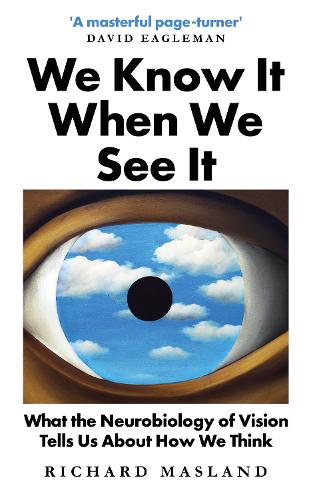
We Know It When We See It: What the Neurobiology of Vision Tells Us About How We Think
(Hardback)
Publishing Details
We Know It When We See It: What the Neurobiology of Vision Tells Us About How We Think
By (Author) Richard Masland
Oneworld Publications
Oneworld Publications
2nd March 2021
7th January 2021
United Kingdom
Classifications
General
Non Fiction
Physiological psychology, neuropsychology, biopsychology
Anatomy
Neurosciences
Cognitive studies
Human biology
Artificial intelligence (AI)
Algorithms and data structures
612.84
Physical Properties
Hardback
272
Width 135mm, Height 216mm, Spine 24mm
Description
"Spotting a face in a crowd is so easy, you take it for granted. But how you do it is one of sciences great mysteries. Vision is involved in nearly a third of everything a brain does and explaining how it works reveals more than just how we see. It also tells us how the brain processes information how it perceives, learns and remembers. In We Know It When We See It, pioneering neuroscientist Richard Masland covers everything from what happens when light hits your retina, to the increasingly sophisticated nerve nets that turn that light into knowledge, to what a computer algorithm must be able to do before it can truly be called intelligent. It is a profound yet accessible investigation into how our bodies make sense of the world."
Reviews
'A masterful page-turner that braids science and the stories behind the science. Wise, insightful, and written with the approachability and wisdom that only a veteran of the field can achieve.'
-- David Eagleman, neuroscientist at Stanford, New York Times bestselling author'We Know It When We See It is the definitive description of the neuroscience of perception. Using language anyone can understand [...] Anyone interested in perception, machines that can learn, or how the brain works should read it.'
-- Andrew D. Huberman, Professor of Neurobiology and Ophthalmology, Stanford University School of Medicine'How do we recognize a face in a crowd Starting with this question, Masland teaches us not only how we see but how we think and remember. Step by step, he paints a picture of the brain as a dynamic, wide-ranging coalition of nerve nets. This picture provides striking parallels with artificial intelligence and highlights the remarkable adaptability, creativity, and resilience of the brain.'
-- Susan R. Barry, Author of Fixing My Gaze and Professor Emeritus of Neuroscience and Behavior, Mount Holyoke CollegeAuthor Bio
Richard Masland was the David Glendenning Cogan Distinguished Professor of Ophthalmology and Professor of Neuroscience at Harvard Medical School. He was previously Director of Research at the Massachusetts Eye and Ear Infirmary, the worlds largest vision research institute. He died in 2019, and is remembered for his groundbreaking contributions to the study of neural networks and to the reversal of blindness. This is his last book.
